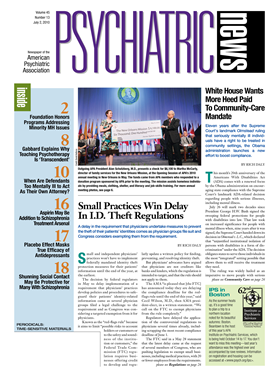“Get a life!” people sometimes quip.
“Well, that's not easy to do if you've got schizophrenia,” an individual with this illness might respond.
But it might still be possible. The reason? Negative beliefs about a social life seem to be the major reason why individuals with schizophrenia don't have a social life, a new study has found. And if that is the case, then changing those beliefs might help them “get a life.”
The study was conducted by Paul Grant, Ph.D., a research assistant professor of psychology in psychiatry at the University of Pennsylvania, and Aaron Beck, M.D., University Professor Emeritus of Psychiatry at the University of Pennsylvania. Beck is also considered “the father of cognitive therapy.” Results were published in the May 15 Psychiatry Research.
People with schizophrenia tend to isolate themselves from others, yet at the same time they say that they would like to have friends, get a job, and perhaps have a family. What is the explanation for this discrepancy? Could it be negative beliefs and expectations rather than the illness itself? Grant and Beck conducted a study to find out.
The study sample included 123 adults with an average age of 39 who had been diagnosed with schizophrenia or schizoaffective disorder. Various scales were used to evaluate subjects on social functioning, neurocognition, emotion perception, positive symptoms, negative symptoms, depression, anxiety, and negative beliefs about social functioning.
Negative beliefs about a social life were determined with 15 statements from the Revised Social Anhedonia Scale. Several of the statements, for example, were “People are usually better off if they stay aloof from emotional involvement with others,” “Making new friends isn't worth the effort it takes,” and “Having close friends is not as important as most people say.” For each statement, subjects answered yes or no. Subjects' responses were summed into a total score of 0-15, with higher scores indicating more negative beliefs about a social life.
The researchers then used correlational analysis to see whether there were any orderly, predictable relationships between subjects' social functioning scores and their scores on the other measures. None could be found between their social functioning scores and their neurocognition, emotion perception, positive symptoms, and anxiety scores. But such a link could be found between their social functioning scores and their negative symptoms, depression, and scores indicating negative beliefs about the value of a social life.
And most striking, high scores on negative beliefs about a social life were associated with poor social functioning scores.
The researchers then determined the relative contribution to social functioning of neurocognition, emotion perception, negative symptoms, depression, and negative beliefs about social function. They found that neurocognition and emotion perception contributed a negligible amount—a finding that surprised them—but they also found that negative symptoms and depression accounted for somewhat more, and that negative beliefs about a social life accounted for the largest contribution to social functioning.
Finally, they conducted a longitudinal analysis of 13 of the subjects to see whether negative beliefs about social functioning at baseline significantly predicted social withdrawal a year later, or whether social withdrawal at baseline predicted negative beliefs about social function a year later. The former was the case.
Putting all these results together, it looks as if negative beliefs about a social life may be a major reason why people with schizophrenia don't relish social interactions, the researchers concluded. “We propose that the patients' asocial beliefs trump their need for social acceptance,” they wrote.
And, if that is the case, would certain interventions help individuals with schizophrenia change such beliefs and thus improve their social lives? The researchers think that they might.
For example, “encouraging the patient to engage in social contact can expose the dysfunctional beliefs, which can then be the target for cognitive restructuring. Various behavioral techniques such as social-skills training and assertiveness training can facilitate social engagement and demonstrate to the patient the positive consequences of social engagement.... Modifying beliefs that maintain depression, which is also linked to poor social functioning, can further motivate the patient to socialize productively.”
The study was funded by the Foundation for Cognitive Therapy and Research, NARSAD, and the Heinz Foundation.
